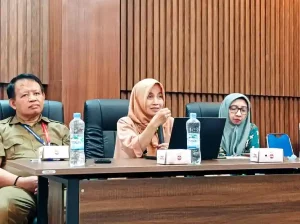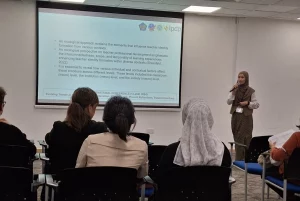UNAIR NEWS – A recent surge in COVID-19 cases has been reported in Singapore. According to the Singaporean Ministry of Health, the number of COVID-19 cases reached 25,900 from early to mid-May. This spike has raised concerns in neighboring countries, including Indonesia.
One of the causes of this increase is the emergence of new COVID-19 variants, such as KP.1/KP.2 and JN.1. These variants are more transmissible but lesser scale of severity. The surge has strained the healthcare system, leading to more hospitalizations and ICU admissions.
Kurnia Dwi Artanti, MD, M.Sc., an epidemiologist at the Faculty of Public Health (FKM) Universitas Airlangga (UNAIR), gave her response in the spike of COVID-19 cases. She noted that high population mobility and social activities significantly increase the risk of COVID-19 transmission.
“When mobility and social activities are high, interactions and contacts between individuals rise. This elevates the chances of spreading virus-contaminated droplets,” Kurnia explained.
Concerns about transmission in Indonesia
Given its geographical proximity to Singapore, Indonesia must remain vigilant. The high level of interaction and activity between the two countries further amplifies this need.
This geographical closeness, according to Kurnia, can be a primary factor in the potential spread of COVID-19. “High population mobility and international travel can facilitate the virus’s spread through droplets or physical contact,” she stated.

As a precaution, Kurnia emphasized the need for more public vigilance. She highlighted the importance of wearing masks in high-risk areas, such as hospital wards, healthcare facilities, and when using public transportation.
“Although mask is no longer mandatory, it can be considered a secondary prevention measure, providing self-protection,” she explained.
Need for vigilance
Kurnia further emphasized that the Indonesian government must enhance vigilance and strengthen the healthcare system to prevent transmission. “This is crucial, even though we have adjusted our healthcare system and public response to manage the situation more effectively than at the pandemic’s onset,” she said.
In conclusion, Kurnia underscored that vaccination remains the primary defense against COVID-19. She urged the acceleration of vaccination campaigns, particularly encouraging vulnerable groups to complete their vaccinations promptly.
Author: Hana Mufidatuz Zuhrah
Editor: Yulia Rohmawati









